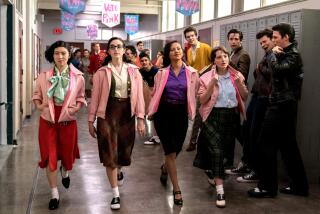TV Themes That Arrested Our Attention
- Share via
What makes for a great TV show? An original premise, of course, or at least a fresh spin on a proven one. Then there are smart scripts, inspired casting and brilliant acting.
But even with those elements in place, there’s one more thing a truly classic show needs: great theme music.
For the record:
12:00 a.m. Oct. 12, 2000 For the Record
Los Angeles Times Thursday October 12, 2000 Home Edition Calendar Part F Page 56 Entertainment Desk 2 inches; 42 words Type of Material: Correction
TV themes--In a story in Tuesday’s Calendar about two “Crimestoppers” CDs with TV show theme music, the composers of the music from two series were credited incorrectly. The theme to “Dragnet” was composed by Walter Schumann, and the music for “The Streets of San Francisco” was written by Pat Williams.
That’s the underlying point of the first two CDs released under a new joint arrangement between the TV Land cable channel and Rhino Records called “Crimestoppers,” TV Land’s umbrella for the vintage TV police and private eye shows it carries.
“Dragnet” wouldn’t have been the same if it had opened with some bouncy roller-rink organ music instead of the ultra-square, voice-of-authority “dum-da-DUM-dum.” And you just can’t imagine “Hawaii Five-O’s” Jack Lord swinging into action to the strains of a sweet island steel guitar, rather than the thundering surf-rock track by Mort Stevens that became a Top 10 pop hit in 1969 when the Ventures rerecorded it.
*
*** “TV Land Crimestoppers:
TV’s Greatest Cop Themes”
Rhino/TV Land
*** “TV Land Crimestoppers:
TV’s Greatest P.I. Themes”
Rhino/TV Land
These two CDs clearly fall under the umbrella of guilty pleasures, but there’s also a bit of cultural history to be gleaned from the selections.
The cop disc opens appropriately with signature music from the show that first brought a sense of law and order to the young medium of television, “Dragnet.” The relentless march supplied by the drums and low brass in Ray Anthony’s theme music perfectly reflected “Dragnet” creator Jack Webb’s no-nonsense attitude.
Over time, the line separating the good guys from the bad guys has become blurrier, and by the time we get to the ‘80s, “Dragnet’s” unequivocal march gives way to the far more reflective Mike Post theme to “Hill Street Blues,” as low-key and inward-looking as “Dragnet” was outgoing and self-righteous.
The cop’s entrepreneurial counterpart is the private investigator, and was there ever a more fitting match between musical theme and subject than Henry Mancini’s music for “Peter Gunn”? The pulsing bass notes of the piano in unison with a sinister electric guitar signaled the sense of danger awaiting Gunn and his scrappy brethren around every corner.
Here too we detect the evolution of the TV P.I. over the decades. In the ‘50s, in shows such as “77 Sunset Strip” and “Hawaiian Eye,” the private dick was always suave and sexy, even if he did get roughed up each week, whereas the ‘70s and ‘80s investigators were typified by the more laid-back Thomas Magnum of “Magnum, P.I.” or the fashion plates of “Charlie’s Angels.”
Musically, the most interesting development was the incorporation of popular music as rock-loving viewers and musicians got older.
Jazz and film-music-based scores ruled in TV through the ‘50s and ‘60s because they were composed by such classically trained musicians as Mancini and John Williams (still known as Johnny Williams when he whipped up the music for “Checkmate” and “Gilligan’s Island”).
In the ‘70s and ‘80s, however, Post’s rock-driven themes were ubiquitous, from “The Rockford Files” to “Magnum, P.I.” to “Hill Street Blues.” Disco also was a popular choice for TV themes in that era, from Mark Snow’s “Hart to Hart” music to the Dominic Frontiere theme for “Vega$,” many of them taking their cues from Isaac Hayes’ groundbreaking music for “Shaft.”
Keyboardist-composer Jan Hammer expertly embodied the pulse of the percolating ‘80s in his theme to “Miami Vice.” It was one of many shows with themes that became pop hits, in this case a No. 1 single for Hammer.
But these two discs make it apparent that not all themes are created equal.
Quincy Jones’ polyrhythmic jazz-funk music for “The Streets of San Francisco” may have captured the mood of the fast-paced series, but it lacks the indelible melody of the fleet-footed jazz waltz Lalo Schifrin wrote for “Mannix.” Likewise, Mancini’s theme to the squishily romantic “Remington Steele” doesn’t hold a candle to the tight and tough one he wrote for “Gunn”--likely the result of the differences in the shows that inspired the music.
Because there have been far more cop and P.I. shows and themes over the last half-century than could be accommodated on a single disc, it’s easy to come up with high-profile omissions: “Highway Patrol,” “Columbo,” “Adam-12,” “Barney Miller,” “Quincy, M.E.” among the cops, “Barnaby Jones,” “McMillan and Wife” and “Knight Rider” on the P.I. side. It also would have been nice to hear once again Count Basie’s music to the late-’50s Lee Marvin cop drama “M Squad.”
In any case, dramas clearly get the nod over comedies here, meaning this set also misses one of the snappiest, hardest-swinging themes ever to grace a cop series: that of “Police Squad!,” which despite its short life as a TV series spawned a string of “Naked Gun” movies.
Also absent is the theme from another police-centered comedy most anyone over 8 can whistle: “The Andy Griffith Show.” Perhaps the CD’s title means it wasn’t so much the show that had to be great, but the cops therein, thus disqualifying such lovable bumblers as Lt. Frank Drebin, Deputy Barney Fife and Officer Gunther Toody of “Car 54, Where Are You?,” another theme surely embedded in the memories of every baby boomer.
*
** 1/2 Glenn Frey, “The Best of Glenn Frey,” (MCA). Movie and TV cops gave this ex-Eagle a boost with his solo career, first from the high-profile exposure his single “The Heat Is On” got in “Beverly Hills Cop” in 1984, then the following year when “Smuggler’s Blues” and “You Belong to the City” turned up in “Miami Vice,” in which Frey himself also appeared.
While Don Henley has created the more significant body of post-Eagles music, Frey’s solo music has carried much of the same feel-good thrust of his Eagles fare, minus a lot of the musical tension and lyrical insight that elevated the best work by his former group.
Frey shifted from the country-rock Eagles sound to one that emphasized his R&B; leanings, and many of his songs stressed scene- or mood-setting over storytelling or point-making (“I’ve Got Mine” being an exception with its biting portrait of modern self-centeredness). But as exemplified in such songs as “True Love” and “Soul Searchin’,” Frey tends to be most affecting with straight-ahead love songs.
Albums are rated on a scale of one star (poor) to four stars (excellent). The albums are already released unless otherwise noted.
More to Read
The complete guide to home viewing
Get Screen Gab for everything about the TV shows and streaming movies everyone’s talking about.
You may occasionally receive promotional content from the Los Angeles Times.






